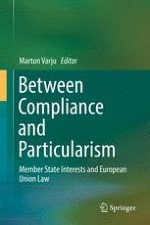2019 | OriginalPaper | Chapter
The Duty of Sincere Cooperation and Its Implications for Autonomous Member State Action in the Field of External Relations
Author : Peter Van Elsuwege
Published in: Between Compliance and Particularism
Publisher: Springer International Publishing
Activate our intelligent search to find suitable subject content or patents.
Select sections of text to find matching patents with Artificial Intelligence. powered by
Select sections of text to find additional relevant content using AI-assisted search. powered by
